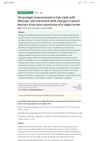1 citations,
January 2024 in “International journal of molecular sciences” MicroRNAs could be key biomarkers and therapeutic targets for PCOS.
 1 citations,
July 2023 in “Chinese Medicine”
1 citations,
July 2023 in “Chinese Medicine” Shi-Bi-Man, a Traditional Chinese Medicine, helps grow hair by boosting lactic acid metabolism and activating hair follicle stem cells.
 1 citations,
May 2023 in “Frontiers in Pharmacology”
1 citations,
May 2023 in “Frontiers in Pharmacology” Millet seed oil may help hair grow by activating certain cell growth signals.
 1 citations,
October 2022 in “Sci”
1 citations,
October 2022 in “Sci” Helmets used in acupuncture and light therapy can affect brain blood flow, hair growth, and may improve brain diseases and cognitive functions.
 1 citations,
January 2024
1 citations,
January 2024 CaBP1 and CaBP2 are necessary for proper hearing and neurotransmission in the ear's inner hair cells.
 1 citations,
November 2023 in “Rice”
1 citations,
November 2023 in “Rice” PRX102 is essential for rice root hair growth by helping transport substances to the tips.
1 citations,
October 2023 in “Animals” A small dose of Platycladus orientalis leaf extract improves raccoon dogs' growth and health, but higher doses can be harmful.
 1 citations,
December 2022 in “Pharmaceuticals”
1 citations,
December 2022 in “Pharmaceuticals” Noni fruit extract, specifically the FEA-3 sub-fraction, can increase hair growth and reduce baldness in male rabbits, potentially acting like common hair loss treatments.
 1 citations,
October 2022 in “Annual review of cell and developmental biology”
1 citations,
October 2022 in “Annual review of cell and developmental biology” The nervous system helps control stem cell behavior and immune responses, affecting tissue repair and maintenance.
 July 2024 in “International Journal of Molecular Sciences”
July 2024 in “International Journal of Molecular Sciences” Hemp seed biomaterials may reduce hair loss and improve hair growth.
 July 2024 in “Pharmaceutics”
July 2024 in “Pharmaceutics” The new hydrogel treatment promotes faster hair growth and better skin health for hair loss.
 May 2024 in “Proteome science”
May 2024 in “Proteome science” Bleaching damages hair by reducing the quality of keratin and keratin-associated proteins.
 April 2024 in “Journal of translational medicine”
April 2024 in “Journal of translational medicine” MJ04, a new compound, effectively promotes hair growth and is a potential topical treatment for hair loss.
 April 2024 in “Communications biology”
April 2024 in “Communications biology” Enzymes involved in Vitamin A metabolism affect hair growth and type in mice.
February 2024 in “Medicina” AFM can diagnose hair disorders by revealing detailed hair surface changes.
 January 2024 in “Authorea (Authorea)”
January 2024 in “Authorea (Authorea)” New punch technologies have improved hair transplant results over time.
Delta-opioid receptors affect skin cell circadian rhythms, possibly impacting wound healing and cancer.

Justicia procumbens extract may help prevent hair loss and improve hair thickness and shine in a type of hair loss condition.
 November 2023 in “Computational and Structural Biotechnology Journal”
November 2023 in “Computational and Structural Biotechnology Journal” A single robotic system can accurately harvest and implant hair grafts, showing promise for real-world use.
 August 2023 in “Clinical, Cosmetic and Investigational Dermatology”
August 2023 in “Clinical, Cosmetic and Investigational Dermatology” The new hair transplant device reduces damage to hair follicles and makes surgery more comfortable for the surgeon.

Certain natural products may help stimulate hair growth by affecting stem cell activity in the scalp.
 July 2023 in “Biomolecules”
July 2023 in “Biomolecules” The circadian clock plays a key role in hair growth and its disruption can affect hair regeneration.
 March 2023 in “Scientific Reports”
March 2023 in “Scientific Reports” Using focused ultrasound on the brain can help epilepsy medicine work better in rats.
Hair proteins in preschool children and their mothers could indicate developmental changes and health status.
 January 2024 in “Biochemical genetics”
January 2024 in “Biochemical genetics” The research found specific genes and proteins that affect how fast chickens' feathers grow, which is not solely determined by traditional inheritance patterns.

CaBP1 and CaBP2 are necessary for proper hearing and neurotransmission in the ear's inner hair cells.

CaBP1 and 2 are important for maintaining the activity of calcium channels necessary for hearing in inner ear cells.
 August 2023 in “Medicina-lithuania”
August 2023 in “Medicina-lithuania” Abusing steroids can damage your heart, muscles, reproductive system, liver, skin, and brain, and may increase the risk of Alzheimer's disease.
FGF9 helps hair follicles grow in small-tailed Han sheep by affecting cell growth and certain signaling pathways.
 November 2019 in “Synapse”
November 2019 in “Synapse” Brain-made chemicals can control nerve cell function differently in various parts of a mouse's brain, which may help us understand neurological conditions.























